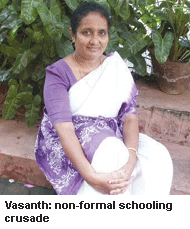 The founder of FICAS (Foundation for Innovative CASe work on Education, Economy and Environment), a non-government organisation established in 1995, Nimmu Vasanth has been fighting a lone battle for the past 14 years to ensure that children of the Kotturpuram slum of Chennai get a decent education. A computer software consultant, Vasanth is a strong believer in the efficacy of non-formal education — “flexible, open-ended and without a rigid curriculum” — to mainstream underprivileged children into regular schooling.
The founder of FICAS (Foundation for Innovative CASe work on Education, Economy and Environment), a non-government organisation established in 1995, Nimmu Vasanth has been fighting a lone battle for the past 14 years to ensure that children of the Kotturpuram slum of Chennai get a decent education. A computer software consultant, Vasanth is a strong believer in the efficacy of non-formal education — “flexible, open-ended and without a rigid curriculum” — to mainstream underprivileged children into regular schooling.
Vasanth’s crusade began in 1995 when a K-VIII unaided school in Kotturpuram shanty suddenly closed down, depriving over 100 children of their right to primary education. Moved by the plight of the ten teachers and students, Vasanth threw open her own small house, where she lived with her husband and two children, to them. And she didn’t stop there. To reach out further to the displaced and voiceless, she registered FICAS in 1995, successfully persuaded the Slum Clearance Board to grant land to build Vidya Nivas School in Kotturpuram and in March 1996, shifted the children to the new building. As enrolments rose to 200, the school was allotted another site of 3,500 sq. ft where for want of funds, the best she could afford was a thatched roofshed as the school building.
In July 2004, in the aftermath of the Kumbakonam fire tragedy in which over 90 children were burnt to death, the Tamil Nadu government ordered all unrecognised schools to close down, stipulating that schools with thatched roofs should replace them immediately. “This was a knee-jerk reaction to the Kumbakonam tragedy caused by the negligent management of the school. Currently, more than 2.5 million students in the state are studying in schools without proper buildings. Yet, instead of allowing non-formal schools in remote rural and urban slums to provide supplementary education to the masses, the state government is depriving them of their fundamental right to education,” says Vasanth, an engineering graduate of Madras University with a business management degree from Tamil Nadu Open University, who worked for over 15 years with several IT multinationals before promoting Niva Systems, a software consultancy firm in 1989.
“There is a national policy that permits non-formal education, yet the state government and media continue to refer to us as ‘illegal’ schools. I’m determined to get a high court order to secure recognition for non-formal schools,” vows Vasanth.
Presently, Vidya Nivas School is being run in a small shed under trees on a reclaimed garbage dump for just 20 children. Due to continuous demolition of its semi-permanent structures by the municipal corporation, most donors have backed out. But Vasanth has been raising funds by conducting manage-ment workshops for corporates, some of whom support her cause. On February 19, she is scheduled to conduct the first edition of her sympo-sium ‘Smart Rungs’ sponsored by Nokia, the proceeds of which will be diverted to FICAS.
A committed education evangelist, Vasanth’s dream is to rebuild Vidya Nivas with proper infrastructure through fund raising. “Right now a writ petition asking for a court directive to the state government to grant recognition to Vidya Nivas is pending in the Madras high court. I am expecting a favourable judgement,” says Vasanth.
Hopefully justice will be seen to be done.
Hemalatha Raghupathi (Chennai)